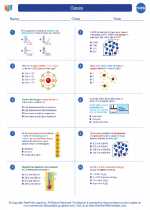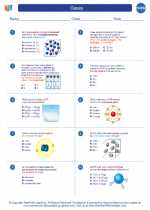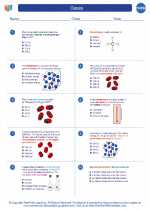Molecular Biology Study Guide
Introduction to Molecular Biology
Molecular biology is the study of biology at a molecular level, including the structure, function, and interactions of biological molecules such as DNA, RNA, and proteins. It encompasses a wide range of topics including genetics, biochemistry, and cell biology.
Key Concepts in Molecular Biology
- DNA Structure and Function: Understand the double helix structure of DNA, its role in encoding genetic information, and how DNA replication occurs.
- RNA and Protein Synthesis: Learn about the different types of RNA, the process of transcription, and translation to understand how proteins are synthesized.
- Genetics and Inheritance: Explore the principles of Mendelian genetics, inheritance patterns, and the role of genes in determining traits.
- Gene Regulation: Study the mechanisms by which gene expression is controlled, including transcriptional and post-transcriptional regulation.
- Genetic Engineering and Biotechnology: Examine the applications of molecular biology in genetic engineering, biotechnology, and the production of recombinant DNA.
Experimental Techniques in Molecular Biology
- PCR (Polymerase Chain Reaction): Understand the principles and applications of PCR in amplifying DNA sequences.
- Recombinant DNA Technology: Learn about the techniques used to manipulate and clone DNA, such as restriction enzymes, gene cloning, and DNA sequencing.
- Gene Editing: Explore the CRISPR/Cas9 system and other gene editing technologies for modifying genetic material.
- Protein Analysis: Study methods for isolating, purifying, and analyzing proteins, such as SDS-PAGE, western blotting, and mass spectrometry.
Applications of Molecular Biology
Understand the practical applications of molecular biology in fields such as medicine, agriculture, forensics, and biotechnology. Explore topics such as personalized medicine, genetically modified organisms, and DNA fingerprinting.
Study Tips for Molecular Biology
- Review and understand the key concepts of genetics and biochemistry before delving into molecular biology.
- Practice drawing and interpreting molecular structures, such as DNA, RNA, and proteins.
- Work on sample problems and questions related to gene expression, genetic engineering, and experimental techniques.
- Stay updated on current research and developments in the field of molecular biology to appreciate its real-world impact.
- Utilize visual aids, animations, and molecular modeling tools to enhance your understanding of complex biological processes.
◂Chemistry Worksheets and Study Guides High School. Gases
The resources above cover the following skills:
Physical Science
Energy - A. Energy is involved in all physical and chemical processes. It is conserved, and can be transformed from one form to another and into work. At the atomic and nuclear levels energy is not continuous but exists in discrete amounts. Energy and mass are related through Einstein's equation E=mc 2 . B. The properties of atomic nuclei are responsible for energy-related phenomena such as radioactivity, fission and fusion. C. Changes in entropy and energy that accompany chemical reactions influence reaction paths. Chemical reactions result in the release or absorption of energy. D. The theory of electromagnetism explains that electricity and magnetism are closely related. Electric charges are the source of electric fields. Moving charges generate magnetic fields. E. Waves are the propagation of a disturbance. They transport energy and momentum but do not transport matter.
Relate temperature to the average molecular kinetic energy.



